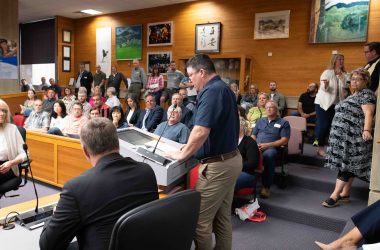Legislators from Salem will seek state money in 2024 to pay for the city’s emergency services, saying the failure of a city payroll tax in November has raised awareness of the unique financial challenges faced by Oregon’s capital city.
Rep. Tom Andersen, a Salem Democrat and former city councilor, plans to introduce a bill when legislators convene in February to have the state share in paying for local services it uses but doesn’t support through property taxes. Sen. Deb Patterson will be a co-chief sponsor in the Senate.
They have support from Gov. Tina Kotek, who said during a Tuesday news conference she would sign a bill providing Salem a regular state payment.
“Having state government in Salem is a benefit and there are also costs to provide public safety services,” the governor said. “I think there is a place for the state to do more to support Salem because of the number of properties we have here, but it will be up to the city of Salem and Salem legislators to bring something in the session.”
The state owns considerable real estate in Salem but is exempt from paying property taxes that fund local government services such as police. If the state paid taxes on its land at the rate private entities do, Salem would collect about $7.5 million more in property taxes per year, Mayor Chris Hoy said.
The concept of the state stepping up is years old, but Salem leaders have gotten little traction until recently raising the issue of a state payment.
“A lot of different pieces have changed,” said Patterson, citing the city’s failed effort to impose a payroll tax. “I think there’s a real recognition that Salem has a unique situation.”
Other Salem property owners pay taxes for the city’s $206 million general fund that covers most city operations, including police and fire. The fund faces a nearly $11 million deficit in 2024 with no new revenue or cuts to services.
City police, fire and emergency medical services respond to state properties and institutions, including the Oregon State Hospital and Oregon State Penitentiary.
Other states budget annual payments to capital cities to make up for the exemption from property taxes. In Washington, the city of Olympia received $1.342 million from the state last year under a similar agreement, according to a contract on the city website.
Hoy briefly served as a state legislator in 2022 and introduced a similar bill, but it died in committee. He met recently with Kotek about the city’s budget challenges and said there’s more state awareness of the financial challenges facing Oregon cities generally, and Salem in particular.
“That was one of my goals with the payroll tax was to gain people’s attention,” Hoy said. “In that regard we were very successful.”
Andersen said the specifics of his bill are still being worked out. Among the issues to be decided are how much the state would pay Salem, and whether the bill would seek money only for the capital city, or apply more broadly to state-owned property in other Oregon cities.
City leaders say Salem is facing a budget crisis because of limits Oregon voters placed on property tax increases in the 1990s. Now, the cost to provide city services grows faster than the tax collections needed to support them.
“The tax system is broken throughout the state. We’re just in a unique situation because we’re the state capital,” Hoy said.
Temporary federal funding during the pandemic helped close the gap over the past few years, but that money runs out in 2024.
City councilors, including the mayor, decided in July by a 5-4 vote to impose a new income tax on Salem workers. The tax was referred to the ballot, where voters rejected it by a 4-1 ratio.
Without that money source, city councilors are now contemplating deep cuts to Salem libraries, park maintenance, firefighters and police.
Hoy cautioned that a state payment alone would not close the city’s budget gap.
“It’s a piece of the puzzle. Under any scenario, I don’t see any way that the state is somehow going to solve our crisis. They’re going to be a part of the solution,” he said.
Kotek on Tuesday also outlined her priorities for the 2024 session, which include a $600 million package focused on housing construction and homelessness. Of that, $65 million would go toward keeping existing shelter beds open, something that could benefit Salem, which used millions of federal Covid relief money to open micro shelter sites in the city.
City councilors voted 8-1 Monday to convene a new revenue task force, which will work next year with the city’s budget committee to suggest other ways Salem could seek more money.
Hoy said the underlying issue is that Oregon needs property tax reform so tax collection keeps up with the cost of providing services.
“I’m turning over all the stones trying to find money,” he said.
Contact reporter Rachel Alexander: [email protected] or 503-575-1241.
SUPPORT OUR WORK – We depend on subscribers for resources to report on Salem with care and depth, fairness and accuracy. Subscribe today to get our daily newsletters and more. Click I want to subscribe!

Rachel Alexander is Salem Reporter’s managing editor. She joined Salem Reporter when it was founded in 2018 and covers city news, education, nonprofits and a little bit of everything else. She’s been a journalist in Oregon and Washington for a decade. Outside of work, she’s a skater and board member with Salem’s Cherry City Roller Derby and can often be found with her nose buried in a book.









